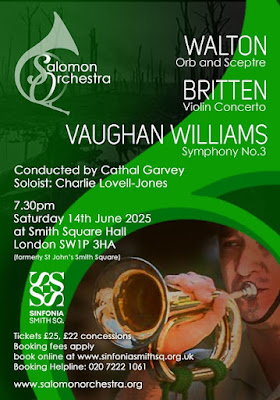This year is the 80th anniversary of the ending of World War Two, and organisations are finding a wide variety of ways to create events that reflect this.
For their concert at Smith Square Hall on 14 June 2025, Salomon Orchestra are joined by conductor Cathal Garvey and violinist Charlie Lovell-Jones for three 20th century English works that resonate with the anniversary in different ways – Walton’s Orb and Sceptre, Britten’s Violin Concerto and Vaughan Williams’ Symphony No. 3 ‘A Pastoral Symphony’.
Walton’s march was written for the coronation of Queen Elizabeth II in 1953 and whilst the work is influenced by earlier marches by Walton himself and Elgar, it also reflects the more confident atmosphere of post-War Britain.
By contrast, Britten’s Violin Concerto was written in 1938/39 and completed in the USA and Canada where Britten and Peter Pears were in self-imposed (and temporary) exile during the war. The premiere was conducted by John Barbirolli in New York and it only reached England in 1941 (at the Queen’s Hall). Often lyrical and elegiac, the work is in rather contrast to Britten’s Sinfonia da Requiem (of 1940) which reflected a darker more intense view of the international situation.
Soloist Charlie Lovell-Jones was a Christ Church Prize Scholar at Oxford University, he graduated in 2020 with a Gibbs Prize in Music. He received a Bicentenary Scholarship at the Royal Academy of Music and graduated in 2022 with the Strings Postgraduate Prize. He was the youngest-ever member of the John Wilson Orchestra and has since led the orchestra on occasion.
Whilst Britten would write the War Requiem in the aftermath of the World War Two, an intriguing fact about the earlier world war was the several of the composers who participated in it failed to write such intense, angry works in the aftermath, composers such as Ravel, Bliss, Holst and Vaughan Williams. RVW began ideas for A Pastoral Symphony whilst he was a stretcher bearer in the Royal Army Medical Corps and rather than the English cow gazing over a fence of Constant Lambert’s jibe, the works initial genesis reflected the bleak landscape of war torn Northern France, with a bugler’s slip in playing the Last Post. The whole tone of the work is reflective. RVW completed the work in 1922 as A Pastoral Symphony, only later numbering it (until his Symphony No. 4 he seemed to push against numbering his symphonies).
Full details from the Sinfonia Smith Square website.


.jpg?w=998&resize=998,665&ssl=1)







